The Cookhouse Shepherd
Posted on June 29, 2018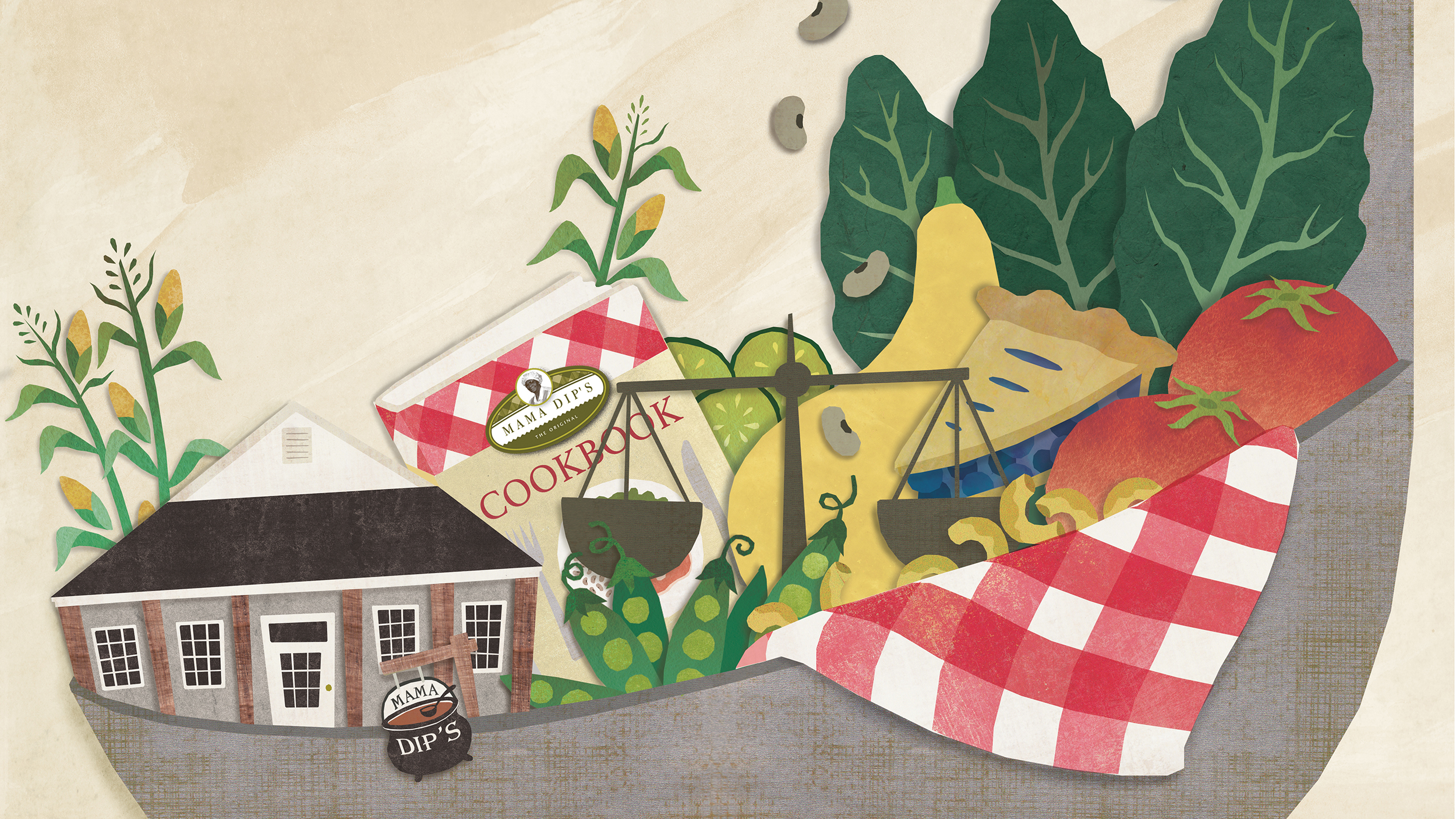
Illustration by Alice Feagan ’06
Of necessity, as a passion and for preservation, Mama Dip’s culinary journey was on nearby paths, worn well by the many who walked with her — especially the family who follow faithfully in her steps.
by Barry Yeoman
Mildred Council was walking toward a taxi stand in Chapel Hill’s Northside neighborhood in 1976 when a real estate agent she knew approached her. He was trying to replace a commercial tenant whose restaurant was failing. Council was working at Memorial Hospital, filling in for a soldier who was about to return and reclaim his job. It turned out to be a providential encounter.
As Council would later recall, George Tate addressed her as “Dip,” her childhood nickname. He gestured toward the restaurant, on West Rosemary Street, and urged her to take it over.
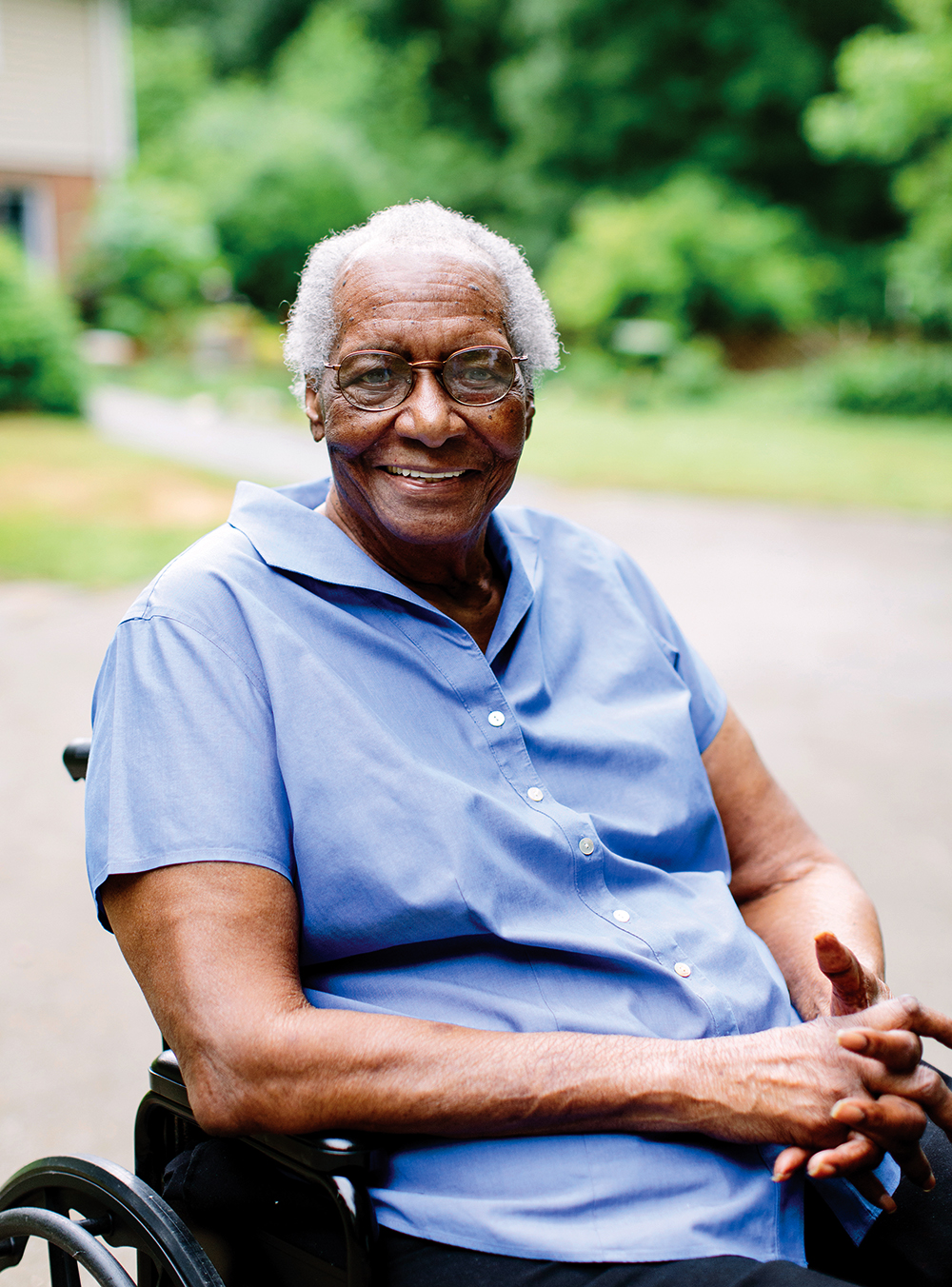
In her 80s, Mildred “Mama Dip” Council began leaving the operations to some of her children and grandchildren, but her vision remained central to the menu. (Anagram photo/Anna Routh Barzin ’07)
“If I wasn’t probably a strong woman, I would think he was just making fun of me,” she would recall. But Council commanded respect — she stood 6-foot-1, for one thing — and she knew the landlord was serious.
At 47, she had established a reputation for her country cooking, developed during her youth on a Chatham County farm and cultivated as an adult to support her eight children. She had worked in private homes. She had cooked for sororities and fraternities, including UNC’s St. Anthony Hall, where the kitchen manager was the young Charles Kuralt ’55. She had fried chicken at her in-laws’ barbecue restaurant, which was known for feeding civil rights demonstrators. She had worked at The Carolina Inn; when a manager there complained about her coffee, she responded, “Why don’t you just make you a pot of coffee in the kitchen?”
She had cooked at a campus dining hall and at the Carolina Coffee Shop, treating the work without sentimentality.
“Somebody’d tell me they’d pay me a little bit more,” she said, “and I was ready to go.”
Now Tate was offering her the chance to run her own restaurant. Council, who had no money to start a business, did not immediately agree. The next Friday, Tate sweetened the deal. “Don’t even worry about rent,” she remembered him saying. “If you make the rent, you make the rent.”
Two days later, with $64 in hand, she bought provisions — bacon, eggs, instant coffee, Pine Sol. The money she earned at breakfast bought the food for lunch.
Nineteen years ago, what began as an 18-spot eatery moved across the street, where it now seats 189 and carries its own line of barbecue sauces, cornbread mix and T-shirts. Mama Dip’s Kitchen has outlived its founder: On May 20, Council died at UNC Hospitals after several months of failing health. She recently had celebrated her 89th birthday.
The restaurant remains in family hands. Almost 43 years after opening, it has become a venerated institution — “a sacred place that people make a pilgrimage to,” said William Ferris, senior associate director at UNC’s Center for the Study of the American South. While 21st-century culinary culture often celebrates innovative dishes that push boundaries and fuse traditions, the Council family’s collards and black-eyed peas tap into a nostalgia felt by many Southerners, black and white.
“What we prepare here is pretty much what Mama prepared when she was growing up on the farm. The smothered pork chops, the greens and the vegetables — whatever she put on our table, that’s what we serve here.”
–Spring Council
“I’ve had people cry, coming in here and eating,” said Tonya Council, Mildred’s granddaughter, who works there. “I hear, ‘These chicken and dumplings taste just like my grandmother’s.’ ”
That veneration extends to Council herself. In her 80s, she began leaving the daily operations to some of her children and grandchildren, but her vision has remained central to the menu.
“What we prepare here is pretty much what Mama prepared when she was growing up on the farm,” said her youngest daughter, Spring Council, who manages the restaurant at night and oversees special events, product distribution and catering.
“The smothered pork chops, the greens and the vegetables — whatever she put on our table, that’s what we serve here.”
The restaurant’s longevity in preserving rural African-American foodways means its reputation has reached beyond North Carolina. “A lot of times, with establishments like Mama Dip’s, when the original owners want to pass the business on, or [they] die, that place goes out of business because the kids are not interested,” said Adrian Miller, author of Soul Food, a dish-by-dish history. “Mama Dip’s is one of just a handful of examples of an intergenerational restaurant.”
At the same time, Mama Dip’s has inspired contemporary Southern chefs by serving food purchased from nearby farms, cooked in styles true to the region. “People talk about local, sustainable — she was local before local was cool,” said culinary historian Michael W. Twitty, author of The Cooking Gene, an exploration of the roots of black Southern cooking. “Without women like Mildred Council, the larger cuisine of the New Southern movement is impossible.”
Council’s story touches on farm life, race relations and civic leadership in North Carolina. Scholars and chefs hold her up as the visible head of a history with a long tail: the story of black women who have fed Americans, often with no acknowledgement, since before the founding of the nation. By speaking publicly about her past, she imbued her food with a narrative — a life of hardship, endurance, skills-building and entrepreneurship, belying the myth of the magical black cook who effortlessly conjures the food that nourishes us.
What’s coming up, you pinch it off
“Papa was one of those all-around people — what you’d call a believer,” Mildred Council said in March. She was finishing breakfast at her home, in a piney neighborhood 10 minutes north of downtown. By then, Council was getting around in a wheelchair, and she admitted her memory was shaky.
But her throaty laugh conveyed the strength for which she was known in Chapel Hill. Where her memories were thin, there is voluminous public record to fill in the gaps, including long interviews she gave to UNC’s Southern Oral History Program in 1994 and the University of Mississippi’s Southern Foodways Alliance in 2007.
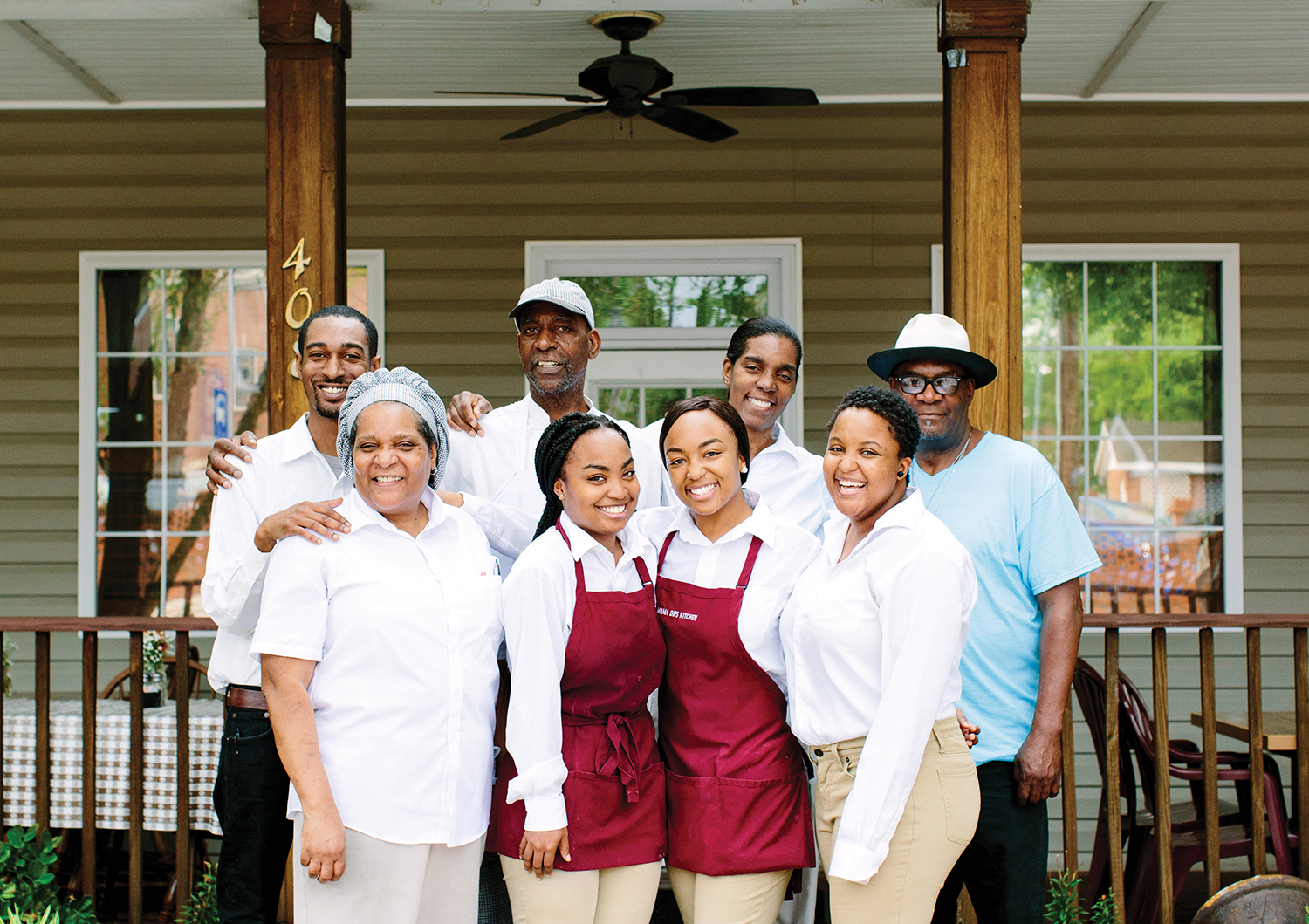
Cooking like family: Front row, from left, are daughter Sandra Council and great-granddaughters Nicole Atwater, Monica Atwater and Natalie Atwater. In back row are grandson Evan Council, son Joe Council, daughter Spring Council and son Geary Council. (Anagram photo/Anna Routh Barzin ’07)
Council never talked about her career without first invoking her father, Ed Cotton, a sharecropper who raised seven children by himself after his wife, Effie, died of breast cancer in 1931. Mildred, the youngest, was 2. “He felt like he could take his children and learn them to cook, the boys and the girls, learn them to plow, to chop cotton,” she said.
The Cottons’ house, north of Pittsboro, leaked and had no indoor toilet. Mattresses were made from sacks stuffed with wheat straw. Dinner was primarily what the family harvested, butchered, canned, foraged, fished and hunted. Water came from a well, and — when that ran dry in the summer — from drums and barrels that caught the rain. Because she was tall, Council could reach the bottom of those containers with a dipper made from a gourd. So she came to be called Dip.
Along with raising his children, Ed Cotton took in what his daughter calls “stragglers”: runaway boys who were abused or thrown out by their fathers. “Papa would make a pallet for them. Papa showed them how to cook. They knew how to go to the garden or the woods and find something to cook. They knew how to get a rabbit. They knew how to cook a squirrel.”
As a child, Council and her older sisters prepared the family’s meals using what was available — they cooked without written recipes.
“What’s coming up, you pinch it off and you cook it,” she said.
Then, when she was 9, Council’s father asked her to take her “turn in the kitchen.” Remembering what she had observed, Council built a fire in the stove — that took a long time — and cut a hambone into pieces with an ax. She boiled whippoorwill peas and baked an egg-custard pie. That was the meal that launched her vocation; she would recall the details, down to the pie’s hint of nutmeg purchased from a traveling salesman, in her 1999 cookbook, Mama Dip’s Kitchen. Council’s father moved the family several times during her childhood — eventually, when Mildred was a teen, to Chapel Hill.
If you were hungry …
After her family left the farm, Council moved in with her grandmother in Durham and attended cosmetology school. She worked for a few months at a Franklin Street salon, but she never enjoyed it.
“That was the hardest job I had. I stood beside the door, outside, to advertise myself: ‘I’ll fix your hair.’ ” Her passion was food — “I wasn’t a beautician” — so she left to cook for a local family.
Meanwhile, she married a man named Joe Council and started raising her own family, leaving her job (as was the expectation) each time she got pregnant and finding new employment after the baby was born. Sometimes she cooked for places that would not have welcomed her family as diners.
She would come home to cook again, including all-day Sunday dinners.
“Many times we’d go up to her house, we could get something to eat,” said Robert Campbell, a Chapel Hill minister and chef whose half-brother, Roy Cotton, Council raised. “Anything from fried chicken, potato salad, cornbread and biscuits, pies and cake — every weekend, it was available.”
“Many times we’d go up to her house, we could get something to eat. Anything from fried chicken, potato salad, cornbread and biscuits, pies and cake — every weekend, it was available.”
–Chapel Hill minister Robert Campbell
Sometimes, he said, nine or 10 children who were not Council’s would show up.
On weekday afternoons, neighborhood children would pour off the school bus and descend on the Council home. “She would have big pots of food on the stove,” recalled Delaine Ingram, a retired beautician who lived across the street. “Chicken and dumplings, pinto beans, biscuits — good food, yes, sir. If you were hungry, you were going to eat.”
Council also made sure the kids were well-dressed and presentable. Once, when Ingram was 8 or 9, she showed up sporting an Afro. “When I got off the bus, she said, ‘Come here. What are you doing going to school like that?’ She made me sit down and she redid my hair.”
Sometimes there would be a knock on Ingram’s door, and it would be Council delivering a meal. “We would get in the car with her as kids, and she would go to folks’ houses that didn’t have food,” said daughter Spring Council. Those with stoves got raw ingredients; those without got cooked meals. “We knew the families. We knew they didn’t have much.”
Living in town, Mildred made sure her children understood the importance of fresh vegetables. “We had to go out to the country and help pick string beans and squash or corn,” Spring said. “It really wasn’t hard labor, but we thought it was the worst thing ever, especially when we encountered a worm.”
For all the wholesome family scenes, Council also was suffering through a marriage that she later described as violent. She told UNC’s Southern Oral History Program that she waited until Spring turned 18, then visited her husband at the pool hall where he worked. “And I said, ‘Joe, I’m leaving.’ Just like that.”
Magic, it is not
It’s entirely possible to eat at Mama Dip’s Kitchen, to enjoy the pork chops and fried chicken, and never to learn about its founder.
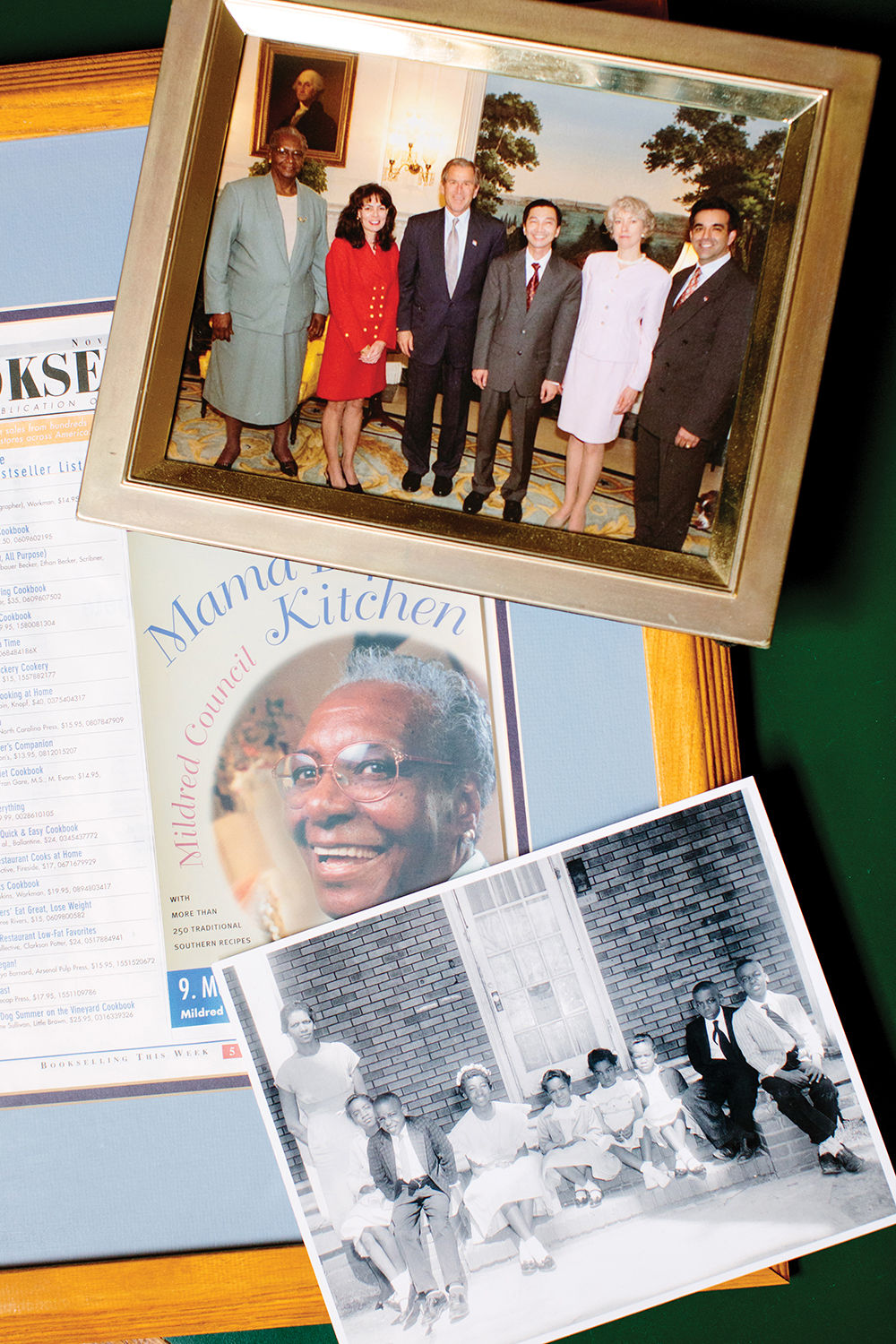
From the walls of her restaurant: With then-President George W. Bush during her White House visit in 2002; her 1999 cookbook; Council and all her children. (Anagram photo/Anna Routh Barzin ’07)
“But knowing those stories helps us to taste the food differently because you’re tasting it with an appreciation for some legacies and some cultures that go into it,” said Psyche Williams-Forson, chair of American studies at the University of Maryland and author of Building Houses out of Chicken Legs: Black Women, Food and Power.
Because Council was so successful, it’s easy to imagine her as a singular virtuoso, stripped of historic context. That would be a mistake. Black women have cooked for America for centuries — on slave ships, as slaves on farms and in cities, on battlegrounds, in brothels and boarding houses, in the kitchens of white families, in whites-only restaurants. They cooked for black travelers who were barred from hotels and restaurants, listing their services in the Negro Motorist Green Book. They sold fried fish, greens and sweet potato pies to help fund the Montgomery bus boycott in the mid-1950s. They cooked for juke joints and church dinners and for sale from their back doors.
Often that history gets packaged as nostalgia, as easy to consume as a sweet potato biscuit. “We hear placid hardships,” Williams-Forson said. “We don’t necessarily hear, ‘I was forced off my land. I was forced out of my restaurant. I had my recipes stolen.’ ” Going further back, she said, “we don’t get the stories of African-American women who passed out in the kitchen, who died over that hearth, sweltering in that hot kitchen. We don’t get the stories of the women and girls who learned because they were punished.”
There was triumph in cooking, too. After the Civil War, food helped foster black women’s financial independence. In her book, Williams-Forson writes about the “waiter-carriers” in Gordonsville, Va., who set up shop on railroad platforms and sold fried chicken, biscuits and coffee to passengers as they rolled through. “Almost every whistle-stop throughout the South had African-American women cooking and hawking and serving food,” she said. Their work, she said, set the stage for entrepreneurs like Council. “With African-American culture, we tend to see folks as isolated, and they’re not. They’re part of a long, rich history of struggle and toil but also of triumph and success.”
Often, the struggle gets papered over, giving rise to a mythology of culinary magicians. “The air of effortlessness has been something demanded of African-American women who cook,” said Elizabeth Englehardt, the John Shelton Reed Distinguished Professor of Southern studies at UNC. The reality is that successful professional cooking — even by someone like Council, who eschewed tablespoons and measuring cups — takes recipe development, practice and refinement, and an armamentarium of business skills. “Part of our culture is to emphasize innate talent rather than the years it takes to hone your craft,” said Miller, the Soul Food author.
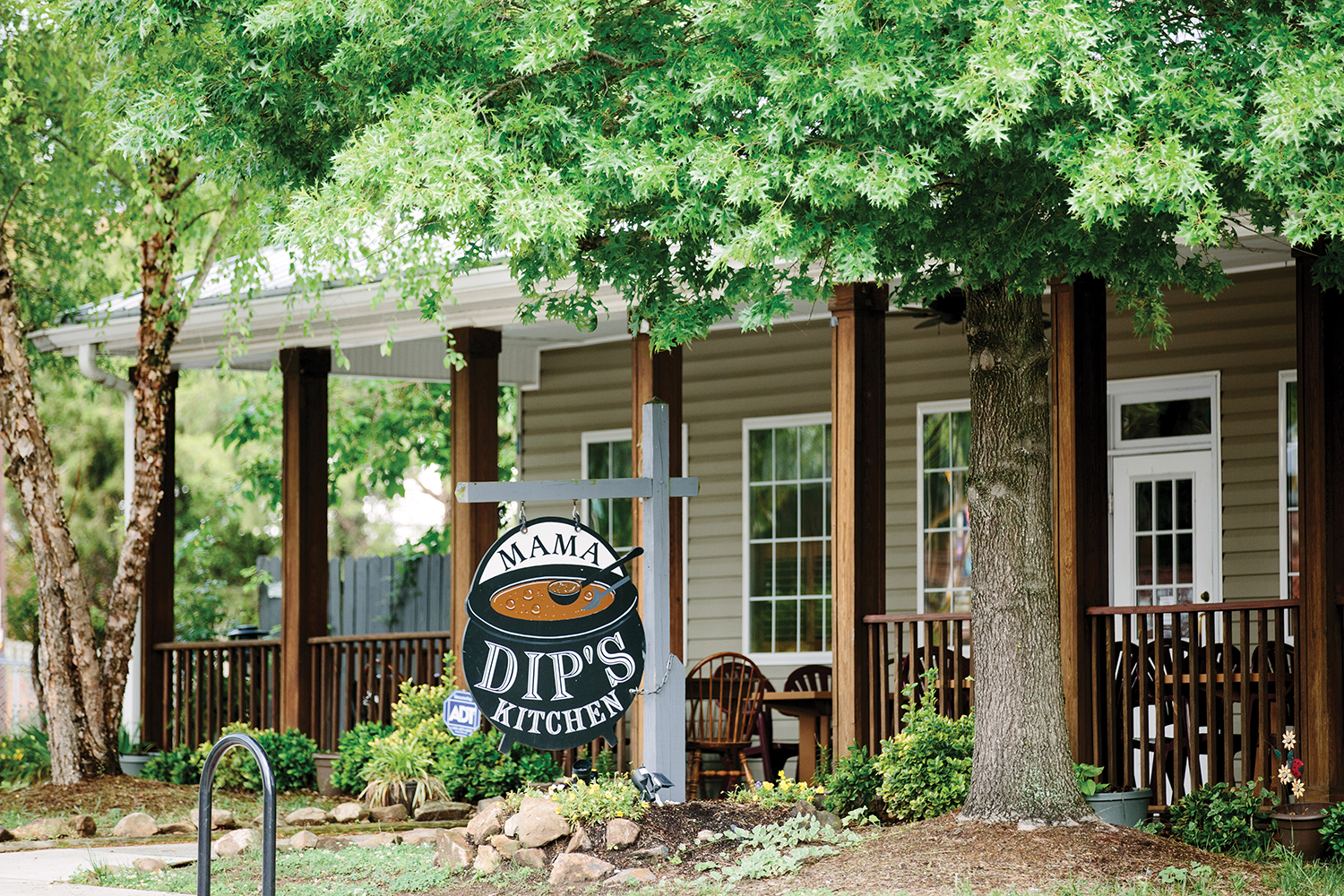
Mama Dip’s Kitchen in Chapel Hill. (Anagram photo/Anna Routh Barzin ’07)
Getting popular, staying focused
The block where Council opened her restaurant felt farther from campus in 1976 than it does today. “[It] was a little bit on the edge,” recalled Bill Smith ’72, the chef at Crook’s Corner, the upscale Southern restaurant four blocks away. “We didn’t care. That’s where you could rent a rundown apartment that you could afford.” West Rosemary Street also marked the southern boundary of Northside, historically the largest African-American neighborhood in Chapel Hill.
At the time, Smith co-owned the music club Cat’s Cradle, which was behind Council’s restaurant, then called Dip’s Country Kitchen. He became a regular. “That was the food I grew up with,” said Smith, a native of New Bern. “To me it was like, ‘Thank God.’ ”
The original Dip’s was tiny, and it was not an instant success.
“Nobody knew who we were,” said daughter Spring. “I remember sitting at the window with her at 5 o’clock in the afternoon and watching the cars pass by, and thinking to myself that people don’t know what’s in here — what my mother cooked.” After a local reporter ate lunch there and wrote an article, customers began arriving more regularly.
In time, national accolades followed. In 1985, New York Times food critic Craig Claiborne stopped at Dip’s during a North Carolina tour. He and his companion ate fried chicken livers (“as crisp and tasty as any I have ever had”), black-eyed peas, okra and peach cobbler. What caught the staff’s attention was Claiborne’s order of a dish created of cleaned pork intestines and associated with American slave tradition.
“They had all this silver on the table. And all those doggoned spoons, and the glasses clinking, and I didn’t know a damn thing to do with them.”
–Mildred Council, recounting her 2002 trip to the White House
“My daughter Lane waited on him,” Council recalled in an oral history; the written transcript is in Wilson Library: “ ‘Mama,’ she says, ‘there’s a white man out here, and he ordered chitterlings. What I suppose to tell him?’ I said, ‘Lane,’ I said, ‘go back and ask him do he want ’em fried or do you want ’em boiled.’ ”
By the late 1990s, Council had appeared on Good Morning America and her restaurant had been featured in Southern Living. She moved into her own 4,200-square-foot building in 1999, the same year UNC Press published her first cookbook. (She sold tens of thousands of copies on the QVC shopping channel.) In 2002, Council was invited to the White House, where she met President George W. Bush as she was honored as a small-business owner.
“They had all this silver on the table,” she recalled of that dinner. “And all those doggoned spoons, and the glasses clinking, and I didn’t know a damn thing to do with them.”
For all the national exposure, Council’s focus remained close to home — a civic extension of the caretaking she did when she was raising her kids and feeding the neighborhood. She employed and trained inmates on work release and addicts in a recovery program. She created a fund to support children’s services. And in 2000, then-Gov. Jim Hunt ’64 (LLBJD) gave her the state’s highest honor, the Order of the Long Leaf Pine award.
For 21 years, Council catered and helped plan the Community Dinner, an annual event showcasing the diversity of Chapel Hill and Carrboro.
“One dinner, they predicted snow,” said Nerys Levy, an artist and one of the organizers. “I went over to the restaurant, and there she was, at 8 o’clock in the morning, cooking. Her daughter told me that, that night, they’d had a burglary. Her mother said, ‘Forget that,’ and there she was preparing the dinner after this home invasion. She said, ‘The dinner will go on.’ ”
‘Every one of my children can cook’
Mildred Council’s country dinners continue to influence others.
“[The menu] is pretty much the way it’s always been, and that’s a good thing,” said Smith, the chef at Crook’s Corner, who visits Mama Dip’s about every six weeks and often orders takeout chicken. “I went through a period of experimentation, but in my old age I’ve returned to the more classical way of doing things. You learn to un-gild the lily as you go along and leave well enough alone sometimes. And she’s always left well enough alone.”
As she neared the end of her life, Council felt confident that her talents had been transmitted to future generations.
“I’m so glad what I’ve done with my children. Every one of my children can cook.”
She did worry that changing American lifestyles mean less demand for plant-heavy sit-down meals like the ones served at Mama Dip’s. “People now are in a hurry,” she said. “The vegetable thing is sweeping away. People are not eating vegetables like they used to.”
That doesn’t mean tinkering with the menu, insists Spring Council.
“Our mission statement states that we are here to serve traditional Southern country cooking that the founder, Mildred Council, created,” said the daughter. “That’s what our goal is — to use her recipes. She didn’t create this, and become successful, for us to change it.”
Barry Yeoman is a freelance writer based in Durham.
Thanks for reading the Carolina Alumni Review
Carolina Alumni members, sign in to continue reading.
Not yet a member? Become one today.
